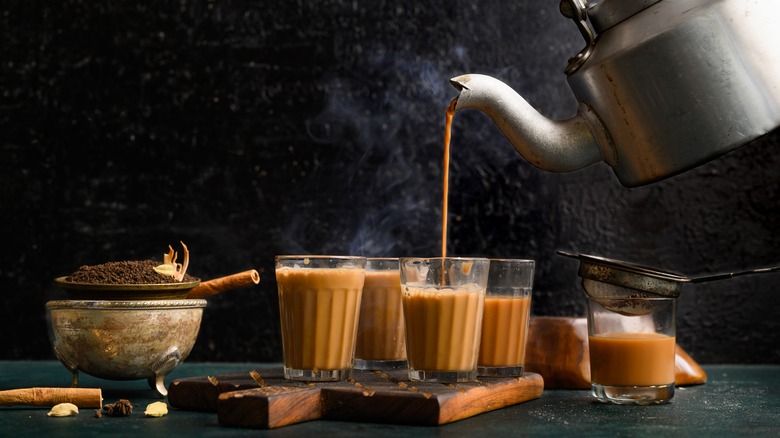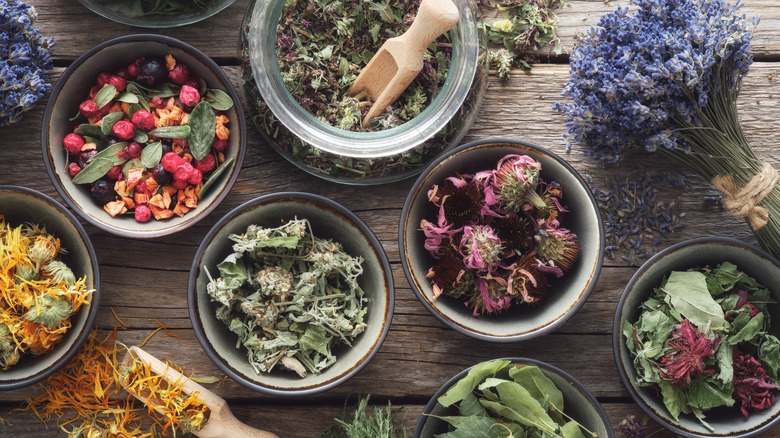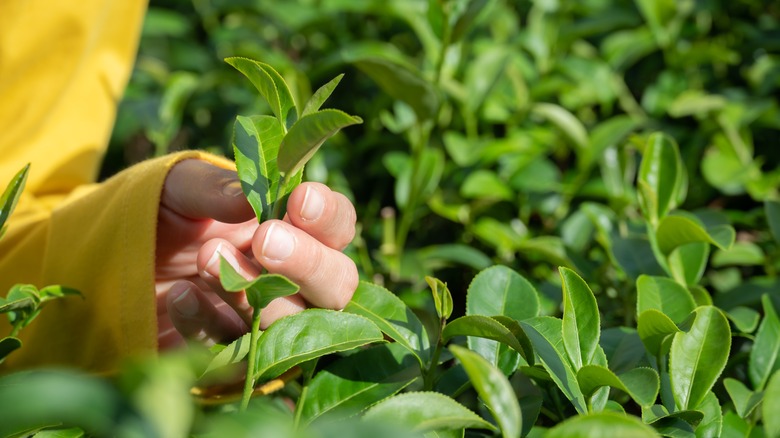The Simple Reason Herbal Tea Isn't Actually Tea
Herbal tea is a rare kind of beverage that is altogether healthy, naturally flavorful, and also, usually, caffeine-free. With its earthy taste, enticing aroma, and natural ingredients, it's the perfect drink for those bored of plain water but reluctant to reach for some commercial "healthy" drink that is actually anything but. Herbal tea is the real deal, and its long list of benefits is a testament to that.
While the positives of each herbal variety vary, from peppermint and sage to echinacea, there are many reasons why you should give some a try. Each sip could be doing a number of good things for your body including boosting your digestive health, improving brain function, and even fighting off some cancers, says Iora Primary Care.
Aside from having the potential to heal you, herbal tea's flavors are often exciting, from the spiciness of oolong to the sweet taste of hibiscus. There's something for every type of tea drinker. Clearly, there are many good reasons behind herbal tea's popularity, but it might surprise you to learn that herbal tea isn't actually tea at all, despite the name.
So what exactly is herbal tea?
Each of the different types of this beverage comes from an infusion of different naturally occurring plants combined together to produce a distinct flavor. Flowers and spices like lavender, mint, lemon balm, and ginger are often used, as are roots, dried fruits, spices, and more. Combine your pickings of choice together in a sachet and let it steep in some water, and soon enough you've got a cup of delicious herbal tea ready to drink.
The natural elements of herbal tea mean it comes with a whole lot of different health benefits both physical and mental and that is why many people say not to take the drink's effects lightly. What might come as a surprise to many about the drink, however, is that it is not actually tea at all. Contrary to popular belief, the difference is not due to the beverage's caffeine levels. Not every variety of herbal tea is caffeine-free (although most are). Some ingredients used in herbal tea production produce natural caffeine, such as the plant yerba-maté. Artificially-caffeinated herbal teas are also an exception, so make sure to read the tea's labels before buying. So here's the one thing that actually sets herbal tea apart.
Why herbal tea isn't really tea at all
While herbal teas like chamomile and rooibos come from miscellaneous plant roots and buds, traditional tea comes from the leaves of one specific plant called Camellia Sinensis. Affectionally known as the tea plant, Camellia is the defining substance present in the few beverages allowed in the tea category. Those four drinks are black, green, white, and oolong tea.
How can different types of tea all come from the same plant? It comes thanks to the ancient history of tea where the tea-making process began. The differences all come due to the oxidation stage of the Camellia tea leaves. (A process that changes the chemical composition of the tea leaves and thus the taste). Not only does Camellia give tea its taste, but it's also what gives the beverage its caffeinated quality. It's also what makes herbal tea easy to make from home compared to traditional tea since the beverage can come from almost anything.
If you're still not convinced that herbal tea's an imposter, don't just take it from us. According to the president of the Tea Association of the U.S. Peter Goggi, it's confirmed. Herbal tea cannot be classified as real tea, via USA Today. Instead, the drink should be known as a tisane, or, a herbal infusion. But while herbal tea might not actually be real tea, we still love it.


